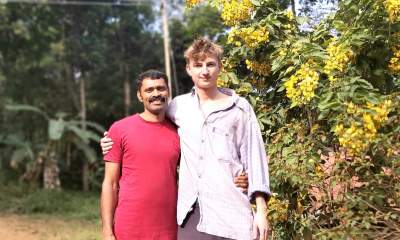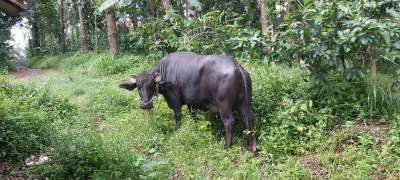Wayanad – A Green and Pleasant Land
Deep in the jungled foothills of the dramatic Western Ghats, one man is striving to maintain a noble tradition that some claim is millennia old. Thomas is a fully trained Master of Kalaripayattu, a fierce martial art thought to be the very first in the world from which all other Eastern martial arts are defended. He teaches daily at his hand built Kalari arena at his home. His incredible school is called Kadathanadan Kalari Sangam.

Thomas’ cozy abode is situated in the Wayanad district of Kerala in a village called Kamana. A district famed for its natural beauty in a state that is described by those that live there as ‘God’s own country’. And I won’t argue with them. Green dominates the views here and the wild jungle rears up and looms over every house, road and field in the area. Thomas’ land exists on the side of a hill that gradually slopes down onto the rich, fertile flood plain of the local river. The land is farmed for crops, vegetables and fruit and livestock is also kept here. Everything that the small farm produces will end up either on the dinner table of Thomas and his family, or in the belly of one of his many animals.

Taking a walk from the house down to the fields, one will notice a wide variety of fruits and herbs growing on the land. A mud-apple tree, branches sagging from the weight of its fruit, stands within spitting distance of the front door. Banana plants – of seven different varieties – litter the side of the pathway through the jungle, their ripening fruit dangling beneath vast surfboard sized leaves. A shaded avenue, formed by a carped of passion fruit vines draped over a bamboo frame, offers up dangling purple fruit, ripe for the picking. A fig tree proudly displays the succulent figs around its trunk. Papaya, cocoa, coconut and grapefruit are among the many other fruits that flourish on the hillside. The fields below the hill offer up a wide variety of vegetables including cabbage, spinach, tomatoes, chillis and many other delicious crops whose names have no English translation.
Bunches of long Napier grass sprout in tufts along the field boundary ready to be cut and fed to the many animals that Thomas keeps here. Three black horned water-buffalo of varying sizes – small, medium and large – live alongside a beautiful white and brown cow in a barn. Goats bleat next-door, chickens scratch about in the dirt around the house, looking for tasty snacks under the soil and gold fish swim around in the sunlight in a shallow well next to the porch. Milk from the large buffalo is used for cooking and, more importantly is mixed into my morning coffee and afternoon chai. The chickens provide rich, organic eggs with bright yellow yolks.
Among these domestic animals roam a variety of wild creatures. Lizards sunbathe on the corrugated tin roof of the shed, salamanders scurry along branches in search of ants, and giant butterflies float and flutter in the sunlight around the flowers in front of the house. Birds of every shape, size and colour dive through the forrest canopy, twisting and turning through the tangle of branches and vines. Eagles glide through the skies above the jungle, eyes fixed on the floor searching for prey. The sound of the birds is inescapable – a constant symphony of birdsong echoes through the shrubbery, some tunes short and sharp others long and chattery. The humming of insects is also noticeable as they zoom through the air, jumping from flower to flower.

This beautiful stretch of land is loyally guarded by Thomas’ two loveable dogs, Lachu and Rana, who spend much of their time dozing in the dappled shade of the forrest.
It is an extremely relaxing and regenerating experience living amongst all this nature. It is extremely hard, if not impossible, to find a place with so much biodiversity crammed into an area this size back in the United Kingdom, where I am from. I feel extremely lucky that Thomas has allowed me to share his gorgeous plot of land with him and his family.






